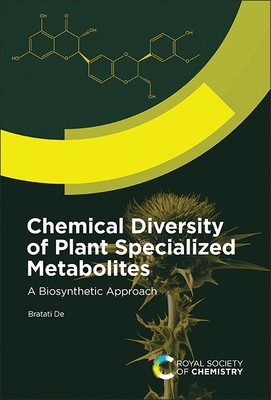
- We will send in 10–14 business days.
- Author: Bratati de
- Publisher: Royal Society of Chemistry
- ISBN-10: 1837670455
- ISBN-13: 9781837670451
- Format: 15.8 x 23.6 x 2.3 cm, kieti viršeliai
- Language: English
- SAVE -10% with code: EXTRA
Reviews
Description
The phytochemical constituents of plants fall into two main categories based on their role in basic metabolic processes: primary and secondary. Primary metabolites are involved in basic life functions and are similar in all living cells, whereas secondary metabolites are derived from subsidiary pathways. Although traditionally referred to as secondary metabolites, more recently these compounds have been termed 'plant specialized metabolites', as the exact biochemical boundary between primary and secondary metabolites has not been fully established.
Plant specialized metabolites are the main element in the study and use of 'medicinal' plants and herbs, as well as in nutrition and food chemistry. In modern medicine, plant specialized metabolites provide many of the lead compounds in the production of medicines targeted at treating a broad variety of diseases. Such metabolites also play an important role in sessile plants: to resist and withstand different biotic and abiotic stresses. Plant specialized metabolites are classified according to their chemical structures and this book will present the different classes in turn, while discussing their sources and distribution in plant families, their biosynthetic pathways, and their important and notable uses in phytochemistry and pharmacology.
Chemical Diversity of Plant Specialized Metabolites will be a useful guide and reference point for chemists and students in many disciplines including synthetic organic chemists, medicinal chemists, plant scientists, pharmacognosists, chemical ecologists, bioengineers, and synthetic biologists, in addition to those working in related fields.
EXTRA 10 % discount with code: EXTRA
The promotion ends in 21d.04:09:27
The discount code is valid when purchasing from 10 €. Discounts do not stack.
- Author: Bratati de
- Publisher: Royal Society of Chemistry
- ISBN-10: 1837670455
- ISBN-13: 9781837670451
- Format: 15.8 x 23.6 x 2.3 cm, kieti viršeliai
- Language: English English
The phytochemical constituents of plants fall into two main categories based on their role in basic metabolic processes: primary and secondary. Primary metabolites are involved in basic life functions and are similar in all living cells, whereas secondary metabolites are derived from subsidiary pathways. Although traditionally referred to as secondary metabolites, more recently these compounds have been termed 'plant specialized metabolites', as the exact biochemical boundary between primary and secondary metabolites has not been fully established.
Plant specialized metabolites are the main element in the study and use of 'medicinal' plants and herbs, as well as in nutrition and food chemistry. In modern medicine, plant specialized metabolites provide many of the lead compounds in the production of medicines targeted at treating a broad variety of diseases. Such metabolites also play an important role in sessile plants: to resist and withstand different biotic and abiotic stresses. Plant specialized metabolites are classified according to their chemical structures and this book will present the different classes in turn, while discussing their sources and distribution in plant families, their biosynthetic pathways, and their important and notable uses in phytochemistry and pharmacology.
Chemical Diversity of Plant Specialized Metabolites will be a useful guide and reference point for chemists and students in many disciplines including synthetic organic chemists, medicinal chemists, plant scientists, pharmacognosists, chemical ecologists, bioengineers, and synthetic biologists, in addition to those working in related fields.


Reviews